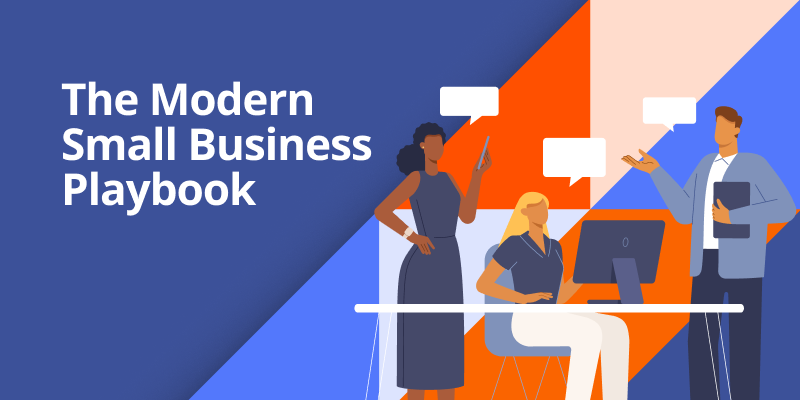To be authentic by definition, is to ensure that something is “Truly what it is said to be.” When dealing interpersonally with customers, it is clear that over-promising and under-delivering never ends well for any business. It erodes trust, destroys reputation and leaves the consumer feeling cheated.
Yet in marketing, it is often posed as a trade-off, or an option to be explored. How far should/could we take liberties with headlines, email subject lines or imagery to generate a click, a lead or an impression.
You’ll see a suite of online service providers with hidden pricing, finding ways to hide behind their fine print and undisclosed fees. They’ve made a calculated decision that the ends justify the means. That the pursuit of the sale trumps the ongoing relationship and the brand sentiment after that initial cha-ching.

Free Guide: The Modern Small Business Playbook
DownloadThat may have worked historically, but it doesn’t work today. Here are 3 reasons why authenticity in marketing is crucial:
- Increased access to competitors: In the digital age, a consumer in New York has many options for any service or provider they want. Use of a smartphone can give them every local provider nearby, or if appropriate, a provider on the other side of the country who provides their goods electronically or has shipping capability. Consumers want authenticity and they are in control. If your business isn’t authentic, consumers will find another that is.
- Fool me twice, shame on me: Consumers are smarter. They’ve seen the ploys and the games. Most, including myself, have fallen for them multiple times. Each one making the next purchasing decision more difficult out of fear of being misled again. While I’m confident the less authentic marketers will constantly find ways to bend the rules and find “the edge,” consumers and the virality of information flow from friend to friend generally shuts these down pretty quickly.
- Reputation is essential: Historically, a friend would tell a friend about a bad experience. It may make it further than that, but damage to a business could be limited. In today’s modern world, your online reputation is everything. A routine breakage of a customer’s trust will eliminate your ability to attract new business. Your advertising will cost more, be less efficient than your competitors. You may get the same eyeballs, but you will get fewer clicks. A sub 3-star business has a pretty rough road ahead unless they straighten up.
So, understanding the need and importance is one thing. But as a small business owner, how do I know if I’m truly being authentic? Below are some tips to review and consider as it relates to your ongoing marketing efforts:
Pricing: If your best work requires a proposal, say so. Don’t include a low introductory offer to get a click that will never end that way. If you can’t install a good pool for $5,000, then don’t include, “Pools starting at $5,000” on your website or in your emails. Instead convey the value you provide, such as strong construction, quality materials, certified craftsmanship.
In this category we’ve often seen, “Options for every budget.” Is this true? EVERY budget? What is your time worth? On one hand you could get more leads, but if they have unrealistic expectations, you’re banking on upselling them from the beginning.
Your goal should be “qualified” Leads. People who are legitimately in the market for the goods and services you produce. If you have standard packages, with a rate card, say so. If you don’t, don’t.
In addition, if it’s time to raise prices on your products or services, don’t give your customers sticker shock. It’s important to be transparent when adjusting your rates. Inform your patrons upfront and identify ways to make the transition smoother by rolling out new costs slowly or adding additional value to your services.

Modern Small
Business Playbook
Find expert tips and tools to help you streamline communications, automate your marketing efforts, improve your business operations, and more in this free guide.
Clean Email Lists: I’m going to say this a few times: Never, ever purchase an email list to send a large-scale email campaign. These consumers did not ask to receive your information. When you do this, your first email starts with a violation of trust by spamming their inbox. It only gets worse from there.
Furthermore, you are likely paying for volume and size. Why pay for volume of uninterested people? Effective email marketing requires segmentation and personalization. If you don’t have these pieces of data, you’re sending a one-size-fits-all message.
It’s annoying and does more damage to your brand then you might know. You don’t want to see your business show up on sites like: The 10 Worst Marketing Emails of All Time.
Let me repeat. Don’t buy a big list, load it into a system, make a flashy email, and hit send.
Lead with Your Best Foot Forward: Let’s face it, you’re biased. Everyone expects you to think your goods and services are the best around. Telling everyone how wonderful you are, or how you are better than the competitor isn’t going to move mountains.
Instead, lead with your recent customers’ own words. Lead with reviews left for your business, photos of the work you just did, and even a video of your customer’s singing your praises.
According to Spiegel Research Center, up to 95% of consumers read online reviews prior to making a purchasing decision. This result is highest when the expected cost of the transaction, meaning someone making a large purchase, will spend more time evaluating the reputation of a business versus someone buying a cup of coffee.
Be Responsive: The world isn’t going to move any slower. Consumers set the pace, and you have to assume if a potential customer is reaching out to you, they are also reaching out to your competitor. Assume this from the beginning. Early bird gets the worm.
Recognize text messages have a 98% open rate, versus email which can be in the 15-30% range. Be open to allowing people to schedule short consultations with you and be open and honest about what will be covered. Are you planning to sell them on the first call? Will it just be an information gathering exercise so you can properly quote them? Be transparent, and you’ll be rewarded.
The most important part is recognizing your aim is to build a long-standing and sustainable business. That means ensuring your reputation remains pristine, and that you are authentic throughout all of your dealings with potential and current customers.
In the end you will have far more potential customers, and they will spread good vibes about your business to their friends, even if they don’t end up purchasing from you. Be yourself, allow your business to have a personality, and above all else, be authentic.


